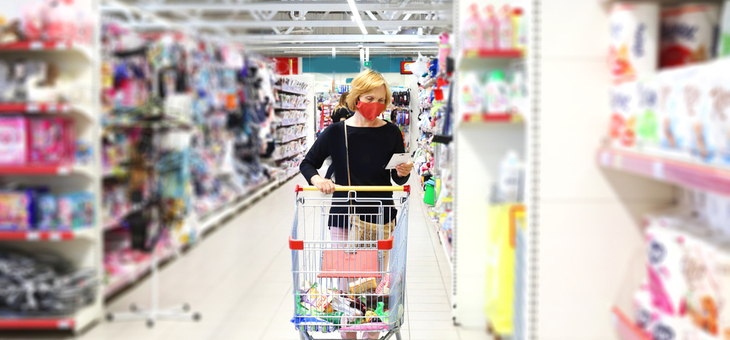Shopping habits changed abruptly when the pandemic hit early last year. Panic shopping forced several retailers to put limits on the most sought-after items and online shopping reached heights that weren’t dreamt of – and that looks set to be maintained.
Rather than revert to pre-pandemic behaviours, research suggests we are ‘maintaining the rage’ and the result is increased prices for grocery staples.
The major supermarkets and research house IBISWorld say we’re spending more money on our weekly grocery shop and our basket sizes are bigger. The panic purchasing that saw customers fighting over toilet paper has changed our shopping behaviour. Once bitten twice shy?
An Australian-first study analysing the price of about 7000 Coles and Woolworths products says we’re being charged more for essentials.
The Institute for Health Transformation study says panic buying in February and March 2020 caused the initial price increase, but those price rises have been sustained, with 15 per cent increases not uncommon.
Read: Supermarket plan to keep shelves fully stocked
Study co-lead, Deakin University’s Associate Professor Kathryn Backholer, said: “Prices did come up after that first wave, [then] we had a period of relative stability in Australia and it [prices] didn’t come down during that time.”
She said a combination of issues were to blame for the continued higher prices, including strong demand that caused essential items to sell out. The average cost of dried pasta, for example, jumped 15 per cent, with one brand even soaring 37 per cent.
She said there had been “some talk” about removing the GST exemption on fresh fruit, vegetables and basic staples, but the pandemic had highlighted the vulnerability of the food system. “It shows that we actually need to retain that exemption.”
Victorian Council of Social Service chief executive Emma King said retailers had a responsibility to ensure price gouging did not occur.
Read: What you’ve been buying in 2021
“Fresh, nutritious food should be on the menu for all … not just the well-off,” she told the Herald Sun. “Unfortunately, good food is often the most expensive. It’s much cheaper to buy junk.”
Comparison site Canstar Blue says Australian households spend on average $153 per week – or about $7344 a year – on groceries. Households in Tasmania spent the least on average ($135 per week), while those in the Northern Territory spent the most ($173 per week).
Woolworths reported a 2 per cent rise in basket sizes in 2020–21 and Coles reported increased shopping trips, with Sunday the busiest trading day.
The big supermarkets also report that ‘lockdown stockpiling’ has continued even as restrictions ease and supply chain issues and staff shortages are exacerbating the problem.
Read: Secret code solves food country of origin mystery
A University of Adelaide study, which surveyed 1000 Australian consumers during June and July last year, found that women under 55 who had children and a university education were most likely to panic buy to counteract uncertainty in their day-to-day life, The Age reports.
The researchers said about one in four of those surveyed was a panic buyer.
Financial counsellor Jane Monica-Jones, a specialist in money psychology, told The Age that stockpiling in a time of crisis was about anxiety and control, and could be a new way of life for some.
Woolworths CEO Brad Banducci says he is “feeling relatively comfortable” with the outlook for the Christmas trading period.
“At this stage we appear to be in a relatively good place for Christmas but our attention now needs to turn, particularly to Big W, back to school at the end of January, making sure – as hopefully all of the kids in Australia get to go back to school – that we can meet their needs,” he told the Australian Financial Review.
Are you ensuring you have ample supplies of essential items in the pantry? Are you finding essentials are costing you more? Why not share your experience in the comments section below?
If you enjoy our content, don’t keep it to yourself. Share our free eNews with your friends and encourage them to sign up.

